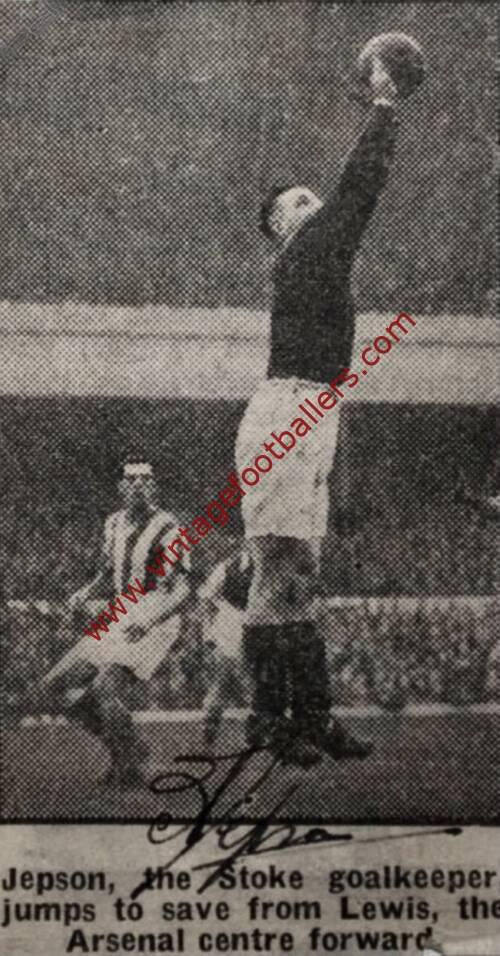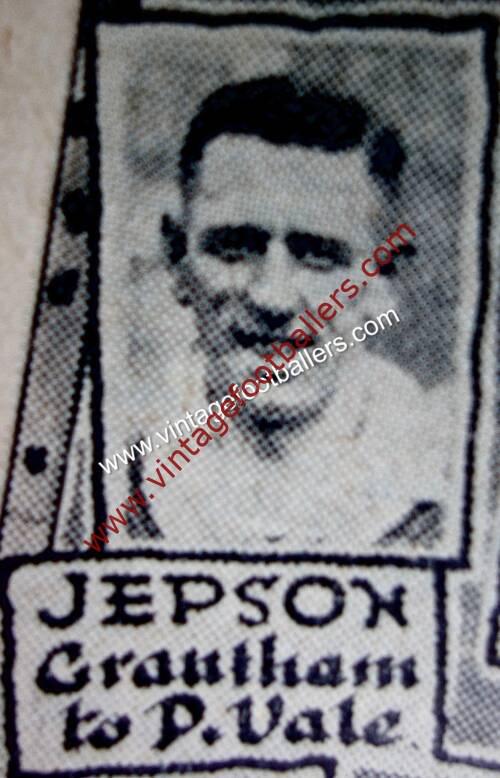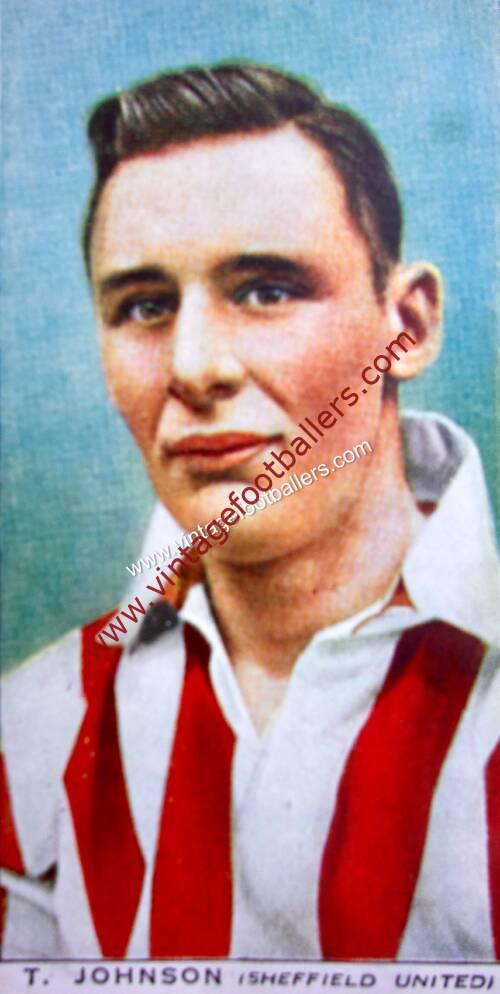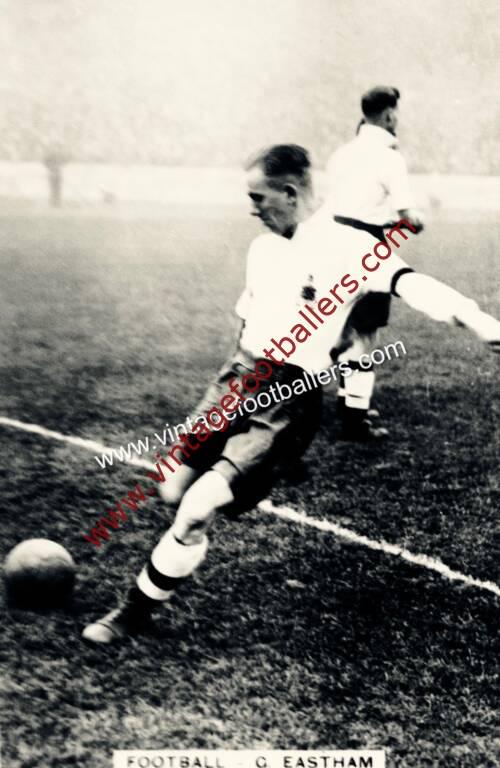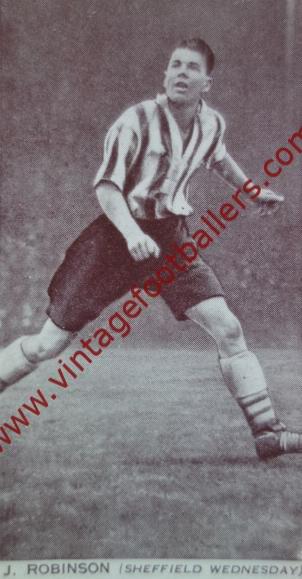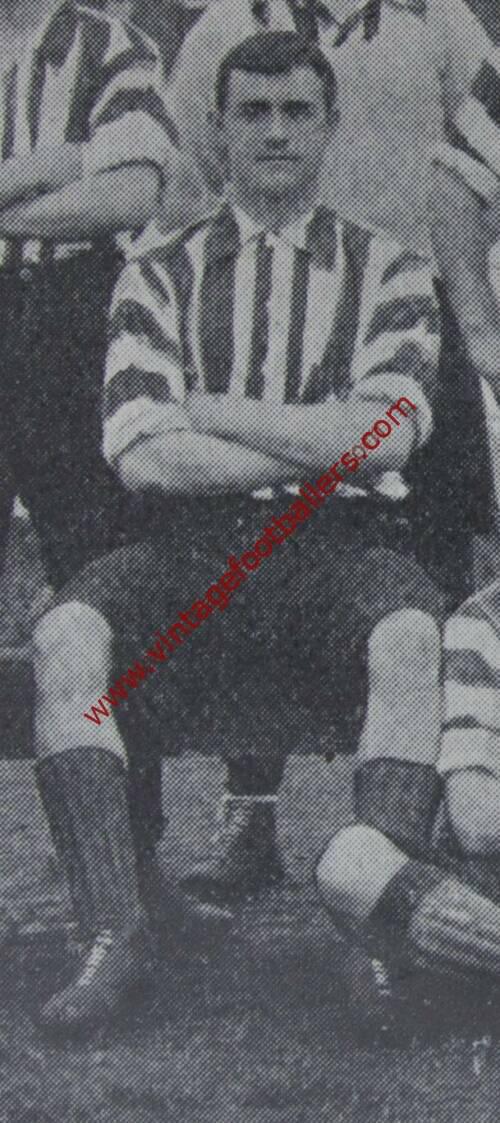Please choose your photo size from the drop down menu below.
If you wish your photo to be framed please select Yes.
Note: 16″x 20″not available in a frame.
Images can also be added to accessories. To order please follow these links
£8.95 – £49.95
In stock
Please choose your photo size from the drop down menu below.
If you wish your photo to be framed please select Yes.
Note: 16″x 20″not available in a frame.
Images can also be added to accessories. To order please follow these links
Selston, Nottinghamshire born goalkeeper Arthur Jepson began his football career with Newark Town in 1933 and joined Mansfield Town in November 1934, still an amateur, making his Football League debut against Halifax Town a month later. He made 3 appearances for The Stags before returning to non league football with Grantham in 1935. In June 1938 he joined Port Vale and missed only three matches in 1938-39, but The Second World War interrupted his career significantly. During the War he guested for Nottingham Forest, Watford, Notts County and Swansea Town. After his demobbing from the forces in October 1945 he was one of six pre-war Port Vale players who returned to Burslem, regaining his place in the side.
After suffering a serious spinal injury in February 1946 he missed the rest of the season. He also missed the start of the 1946-47 season, this time due to his cricketing commitments with Nottinghamshire. In September 1946, having played 53 games for the Vale either side of the War, he was sold to local First Division rivals Stoke City for a £3,750 fee, as Vale manager Billy Frith believed George Heppell to be a superior goalkeeper. Stoke manager Bob McGrory used Jepson in 31 games in 1946-47, ahead of rivals Dennis Herod and Emmanuel Foster, as The Potters recorded a fourth place finish in the First Division – a club record finish that still stands. However Jepson made just one further appearance in 1947-48, with Herod being the preferred stopper.
After two seasons at the Victoria Ground, he moved on to newly promoted Second Division side Lincoln City in December 1948. He kept goal for Bill Anderson’s side in 58 League games, as The Imps were relegated in last place in 1948-49, only missing out on promotion out of the Third Division (North) by four points in 1949-50. Leaving Sincil Bank in 1950 after 60 appearances, he later played for non league sides Northwich Victoria and Gloucester City, and Hinckley Athletic, before becoming the first manager of Long Eaton United in June 1956, before he departed in March 1957 after 15 wins in 29 games. He later managed Hinckley Town and Hinckley Athletic and scouted for Coventry City and Middlesbrough.
He is probably better known for his cricket career as both a player and latterly an umpire.
A right-arm fast-medium bowler, Jepson made his county debut for Nottinghamshire as a 23-year-old in 1938. He was awarded his cap the following year and went on to make 390 first class appearances for the county. He had his best summer in 1947 when he took 115 wickets at 27.78, the only occasion when he took more than 100 wickets in a season. On the back of his prolific summer he represented the Marylebone Cricket Club twice the following year.
In a match against Leicestershire in 1958, his penultimate season, he took a career best 8 for 45 to dismiss Leicestershire in their second innings for 128. He brought up his 1,000th first-class wicket when he had first innings century maker and captain Willie Watson caught by Norman Hill.
He batted mostly in the lower order and made a solitary century in his first class career, an innings of 130 against Worcestershire at Trent Bridge in 1950, when he shared in a sixth wicket partnership of 270 with opener Reg Simpson. He made 11 half centuries and finished with a batting average of 14.31 having scored 6,369 runs in his career. As a bowler he took 1,051 wickets at an average of just over 29 a piece, with 40 five wicket innings and 6 ten wicket matches. He also took 201 catches in first class cricket.
“Jepson was a doughty opponent with all-round skills that buttressed a Nottinghamshire team whose individual capabilities, for most of the early post-war years, were far superior to their teamwork.” (from his obituary in The Independent).
He was rewarded with a £2,000 benefit in 1951 and a testimonial (£1,511) eight years later. After retiring as a player in 1959, Jepson turned to umpiring and officiated in county matches up until 1985. He umpired at the Friends Provident Trophy from 1963 to 1987. Between 1966 and 1969 he umpired four Test matches, the first of which was between England and the West Indies at Nottingham, where Basil Butcher scored a double hundred. He also umpired in five One Day Internationals, including three at the 1975 Cricket World Cup; East Africa vs India, Sri Lanka vs West Indies, and Pakistan vs Sri Lanka. His last stand came in 1985, when he officiated at the NatWest match between Essex and Oxfordshire at Chelmsford.
| Weight | N/A |
|---|
